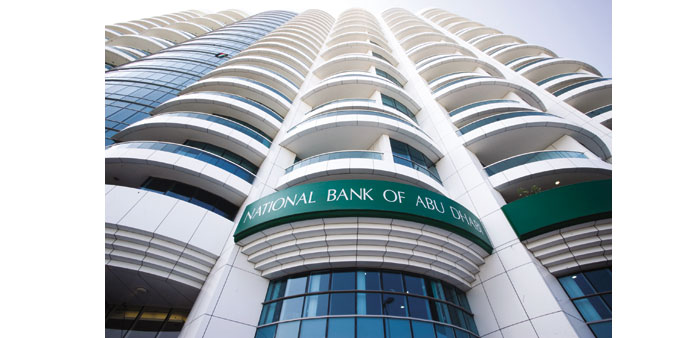A branch of the National Bank of Abu Dhabi stands on the corniche in Abu Dhabi, United Arab Emirates (file). National Bank of Abu Dhabi tapped the Malaysian market with a 15-year, 500mn ringgit ($164.4mn) sukuk in November, its third issue in that currency.
Reuters/Manama
Growth in cross-border Islamic bond issues points to greater convergence in an industry that has been divided by tensions between the Middle East and Asia over sukuk rules, opening the door to a much wider pool of investors.
The Islamic finance industry is centred in the Middle East and southeast Asia, but for the most part those regions have developed independently of each other.
The past year, however, has seen a number of cross-regional sukuk, mostly by Gulf issuers tapping Malaysia’s highly liquid market, the world’s biggest for sukuk issuance. Malaysia’s sovereign wealth fund has also launched a Chinese yuan sukuk.
“Diversification of funding sources is extremely important, that is a big driver for cross-border sukuk,” said Ahmed Abbas, chief executive of Liquidity Management Centre, a Bahrain-based Islamic investment bank.
National Bank of Abu Dhabi tapped the Malaysian market with a 15-year, 500mn ringgit ($164.4mn) sukuk in November, its third issue in that currency.
Bahraini sovereign wealth fund Mumtalakat issued a five-year, 300mn ringgit sukuk in September.
Sukuk are investment certificates which follow religious guidelines, including a ban on interest and pure monetary speculation, and pay a profit rate based on an underlying asset rather than an interest rate as in the case of conventional bonds.
However, their structures are not standardised, and some Gulf-based Sharia scholars have objected to certain structures used in Asia, a region which has proven to be more flexible in its transactions.
“Malaysia and Singapore are far more open and forgiving on Sharia aspects,” Abbas said.
In the latest cross-border sukuk, Al Bayan Group, a private holding company, became the first issuer from conservative Saudi Arabia to tap the Malaysian market, with a small 200mn ringgit ($65.7mn) private placement last month.
The development of sharia-compliant hedging tools is making it easier for issuers to invest in foreign currency assets, said Ijlal Ahmed Alvi, chief executive of Bahrain-based International Islamic Financial Market (IIFM), an industry body which develops specifications for Islamic finance contracts.
Last year, IIFM launched a standard contract template for Islamic profit rate swaps, with others in the pipeline including cross-currency swaps and FX forwards, Alvi said.
Sukuk issuance in the Middle East outside of the Gulf is also becoming more attractive, notably Turkey, which was recently elevated to investment grade credit status and is bidding to develop an Islamic finance industry.
“Turkey is a market to watch — they are developing their regulations to allow issuers to use a variety of sharia structures,” said Alex Roussos, counsel at law firm Norton Rose in Dubai.
“Turkish issuers are highly attractive credits for international investors.”
Cross-border issuance is benefiting from clarity on the legal documentation required for such transactions.
“In terms of global offerings, sukuk will continue to be predominantly English law-governed because of the certainty and predictability that this legal system offers,” Roussos said.
“North African countries I believe will make their presence felt during 2013/2014 as they are nearing completion of the process of creating the legal infrastructure that will enable their sovereigns to tap the markets.”
Egypt this month announced a $12bn bond programme that will include sukuk issuance in early 2014, which would be Irish-listed and governed under English law.
Malaysian issuers have started testing other currencies, in particular the Chinese yuan, although they have yet to tap the Gulf market.
“Cross-border issuance has been one-way traffic, mostly to tap Malaysian liquidity, but conceptually there is nothing wrong with the other way around,” said Sabeen Saleem, chief executive of the Bahrain-based Islamic International Rating Agency.
Malaysian telecom firm Axiata issued a two-year, 1bn yuan ($163.22mn) sukuk in September, following on the heels of Malaysia’s sovereign wealth fund Khazanah Nasional , which issued a 500mn yuan sukuk in 2011.
Malaysia is also promoting overseas investment by its takaful firms (Islamic insurers) as it seeks to internationalise its Islamic finance industry.
To encourage cross-border Islamic business, the Malaysian government has said takaful firms will be allowed to invest abroad without limit, lifting a current requirement for them to hold at least 80% of assets locally.
These firms, with 19bn ringgit ($6.1bn) of total assets as of the end of last year and 60% of it in debt securities, are major investors in domestic sukuk.
Any shift into foreign-denominated issuance could open the sukuk market to an additional pool of liquidity, although takaful firms are highly risk averse and may be reluctant to expand into new markets too quickly.

